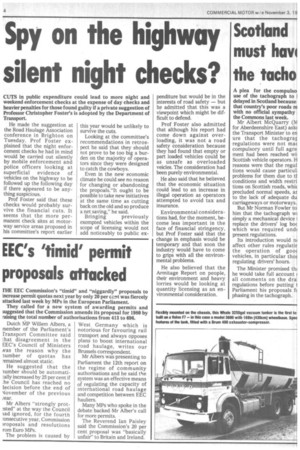Spy on the highway silent night checks?
Page 6

If you've noticed an error in this article please click here to report it so we can fix it.
CUTS in public expenditure could lead to more night and weekend enforcement checks at the expense of day checks and heavier penalties for those found guilty if a private suggestion of Professor Christopher Foster's is adopted by the Department of Transport.
He made the suggestion at the Road Haulage Association conference in Brighton on Tuesday. Prof Foster explained that the night enforcement checks he had in mind would be carried out silently by mobile enforcement and police officers looking at superficial evidence of vehicles on the highway to be followed up the following day if there appeared to be anything suspicious.
Prof Foster said that these checks would probably survive the financial cuts. It seems that the more permanent check sites at motorway service areas proposed in his committee's report earlier this year would be unlikely to survive the cuts.
Looking at the committee's recommendations in retrospect he said that they should not prove to be too big a burden on the majority of operators since they were designed to catch the cowboys.
Even in the new economic climate he could see no reason for changing or abandoning the propoals."It ought to be possible to take new initiatives at the same time as cutting back on the old and so produce a net saving," he said.
Bringing previously exempted vehicles within the scope of licensing would not add noticeably to public ex penditure but would be in the interests of road safety — but he admitted that this was a viewpoint which might be difficult to defend.
Prof Foster also admitted that although his report had come down against overloading, it was not a road safety consideration because they had found that empty or part loaded vehicles could be as unsafe as overloaded veicles. The consideration had been purely environmental.
He also said that he believed that the economic situation could lead to an increase in illegal operation as operators attempted to avoid tax and insurance.
Environmental considerations had, for the moment, become less important in the face of financial stringency, but Prof Foster said that the change in emphasis would be temporary and that soon the industry would have to come to grips with all the environmental problems.
He also believed that the Armitage Report on people, their environment and heavy lorries would be looking at quantity licensing as an environmental consideration.




























































































































